陳定濰 助理研究員
高通量系統基因體學
肝癌與分子醫學
肝腎代謝疾病的動物模式
- 聯絡電話
(07) 731-7123 ext 8880
- 電子郵件信箱
dennis8857@gmail.com
個人簡介
惡性肝腫瘤,尤其是肝細胞癌 (hepatocellular carcinoma),是全球疾病死亡的主要因素之一。 腫瘤細胞與其周圍細胞之間的相互作用和溝通形成腫瘤微環境 (Tumor microenvironments),對於造成局部侵襲和遠處轉移至關重要。 在腫瘤發展過程中,免疫抑制因子從癌細胞中釋放,伴隨著肝腫瘤的強烈免疫致發生特徵,是逃避腫瘤免疫監視的關鍵,並限制了免疫療法的治療效益。具體而言,目前已知自噬作用 (Autophagy) 在腫瘤微環境中扮演主要角色,其在免疫抑制和促進腫瘤惡性化的機制上常有相互矛盾的結果。肝細胞癌進展和轉移與自噬作用的關係,仍是日益受到關注的研究領域。
我們近期的臨床和實驗證據顯示,肝癌細胞的自噬抑制可能有助於加速腫瘤的生長和轉移的進行,其微環境的探討對於進一步的預防和治療非常重要。因此,我們從基礎理論上將脈管系統,炎症控制,凝血和免疫力的角色,作為改善肝臟微環境以預防及治療肝癌的研究目標,並著重於與自噬作用相關的分子事件(靶標與調節因子)。在過去兩年中,我們特別研究了高表達凝血因子 Factor VII 的肝腫瘤組織中,微小核醣核酸 miR-135a 促進肝細胞癌進展的分子機制。
我們也進一步分析 Factor VII 促進復發和轉移的機制,其可能參與一系列促發生長、侵襲和調節上皮−間質轉化可塑性 (Epithelial-to-Mesenchymal Transition, EMT Plasticity) 功能的訊號傳遞路徑。
凝血因子 Factor VII 訊號傳遞引發的自噬抑制導因於 miR-135a 的過度表達,與肝腫瘤惡性化高度相關。
研究證實肝腫瘤中 Factor VII 和 miR-135a 的表達存在顯著的正相關,且 miR-135a 和自噬蛋白 ATG14 表達量有顯著負相關。與鄰近正常肝組織區域相比,腫瘤具有高表達 miR-135a 的肝癌患者,其無疾病存活率 (disease-free survival) 遠低於腫瘤中低 miR-135a 表達的患者。
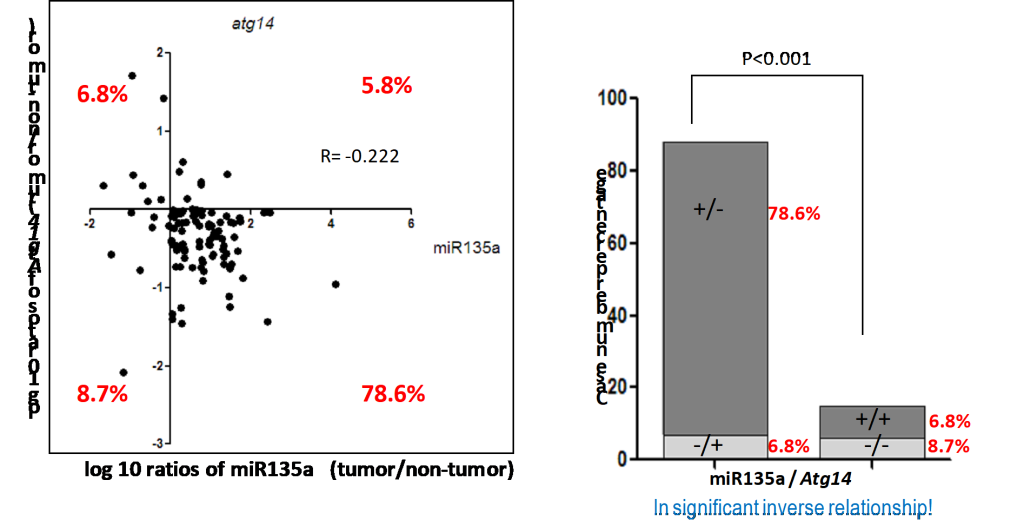
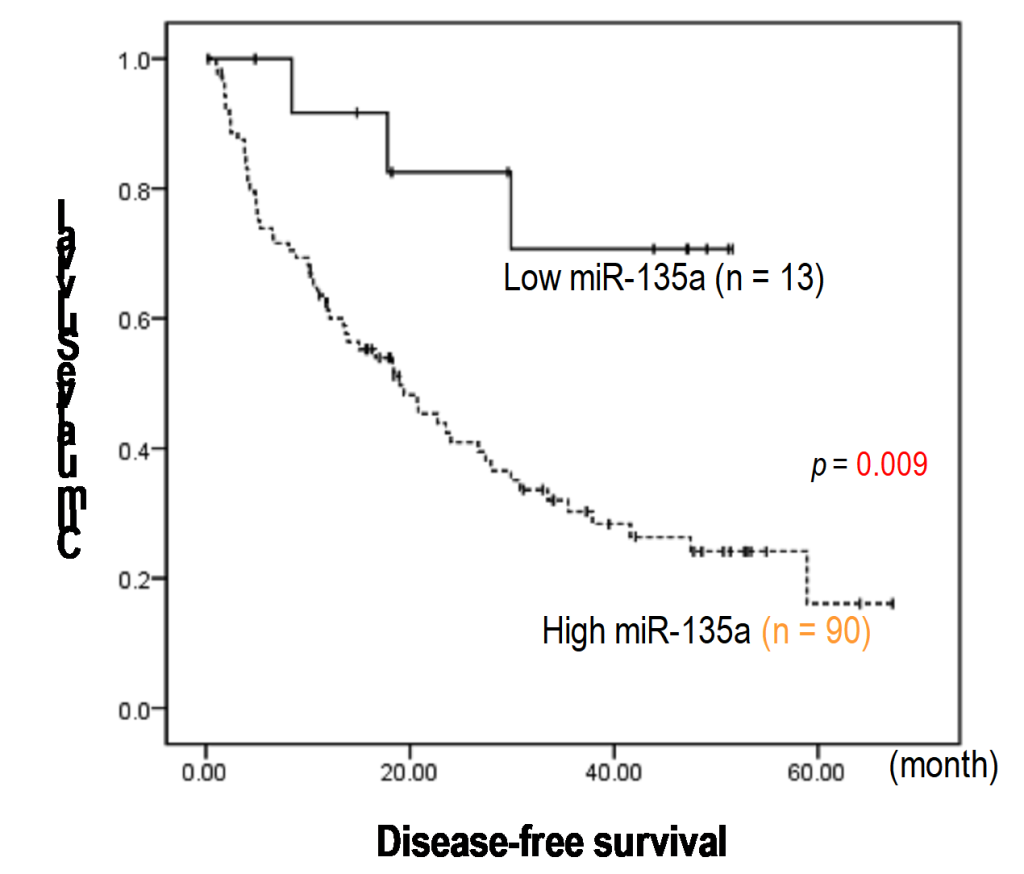
肝癌細胞實驗進一步證實,自噬蛋白ATG14是miR-135a的直接抑制標的,並進一步促進肝癌細胞的生長與侵襲能力。
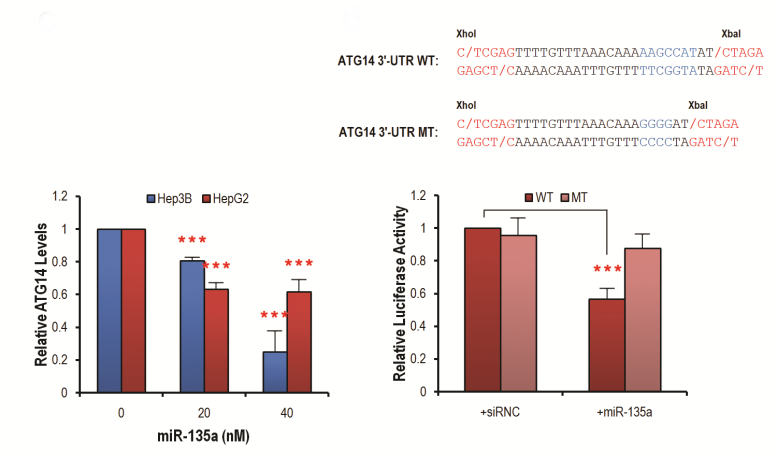
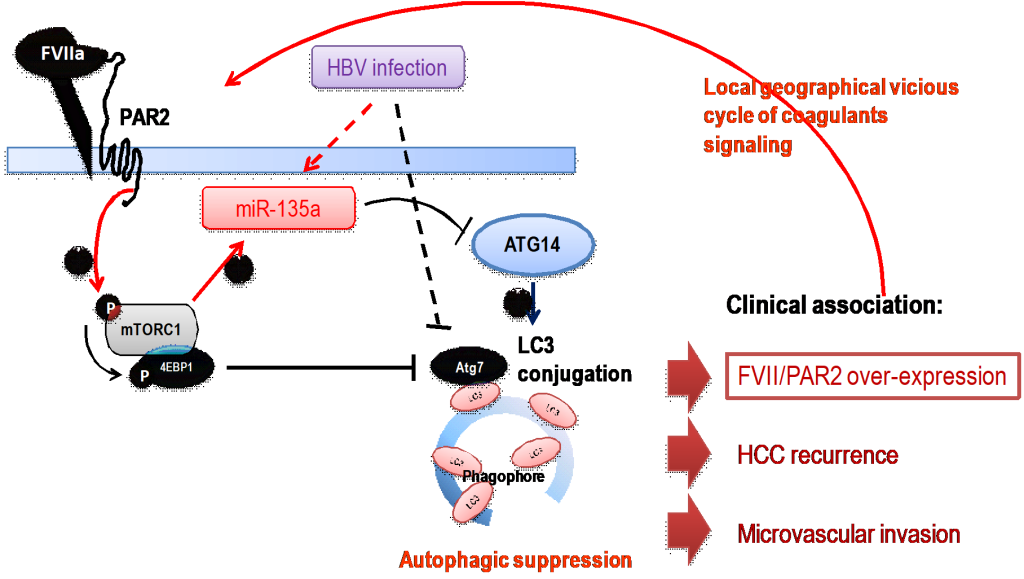
凝血因子Factor VII引發一系列miRNA和mRNA基因的差異表達,在肝癌的腫瘤組織中主導調節癌細胞上皮−間質轉化的功能。
我們進一步發現肝腫組織中,80%與Factor VII表達量相關的miRNAs與上皮−間質轉化的功能有關,其中的77%(75/93, 包括miR-135a)與Factor VII表達量顯著正相關。這些可能參與上皮−間質轉化過程的基因,與細胞粘附(cell adhesion)、細胞凋亡(apoptosis)和免疫反應(immune responses)的負向調節有關。
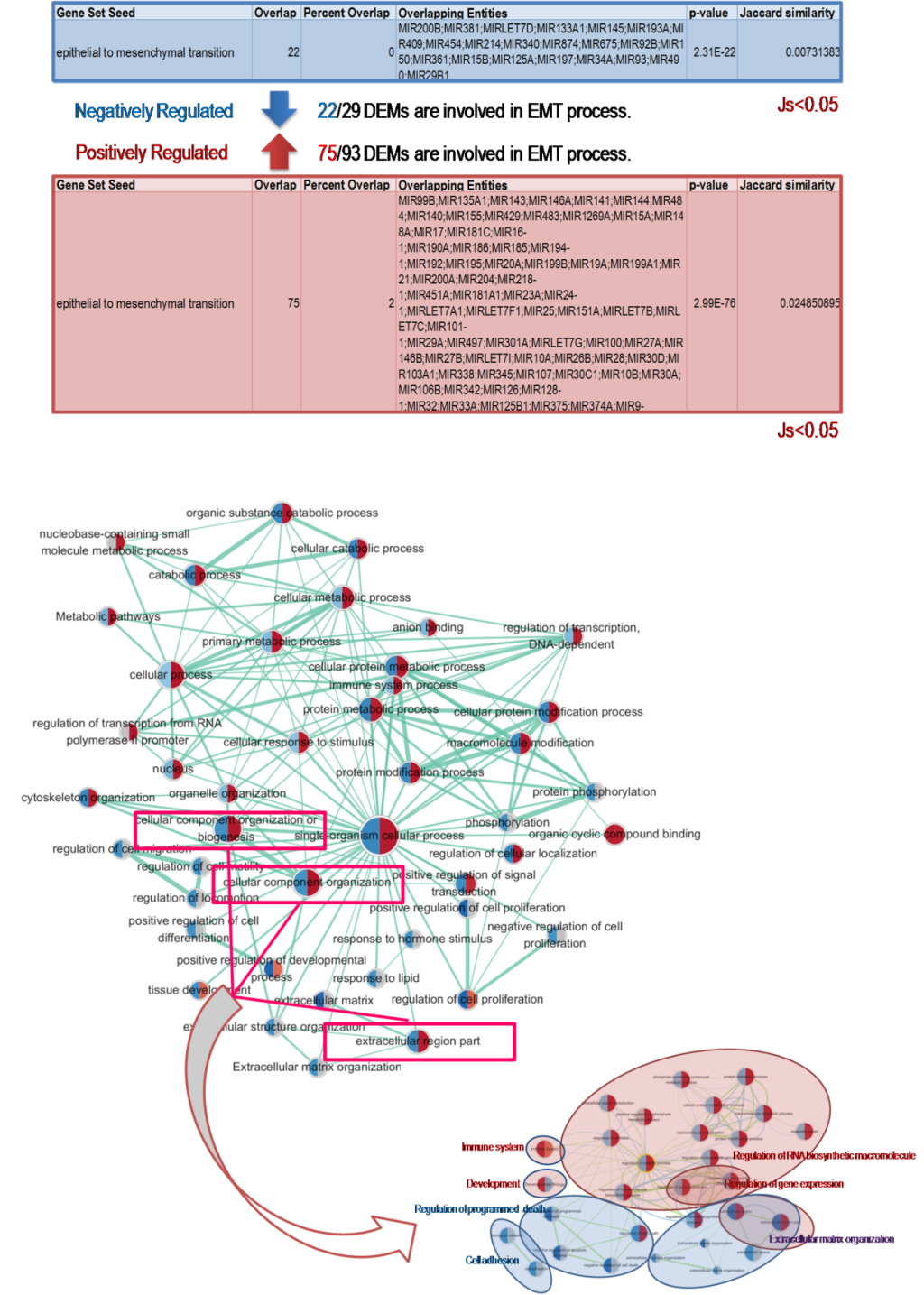
代表著作
Selected recent publications (Pubmed Search)
(† Contributed equally to the article; * Correspondence author of the article)
Huang YH, Chen KD, Lo MH, Cai XY, Kuo HC*. Decreased Steroid Hormone Receptor NR4A2 Expression in Kawasaki Disease Before IVIG Treatment. Front Pediatr, 7: 7 (2019).
Huang YH, Chen KD, Lo MH, Cai XY, Chang LS, Kuo YH, Huang WD, Kuo HC*. Decreased DNA methyltransferases expression is associated with coronary artery lesion formation in Kawasaki disease. Int J Med Sci, 16: 576-582 (2019).
Chen KD*, Lin CC, Tsai MC, Huang KT, Chiu KW. Tumor microenvironment mediated by suppression of autophagic flux drives liver malignancy. Biomed J, 41: 163-168 (2018).
Chen KD, Huang YH, Ming-Huey Guo M, Lin TY, Weng WT, Yang HJ, Yang KD, Kuo HC*. The human blood DNA methylome identifies crucial role of β-catenin in the pathogenesis of Kawasaki disease. Oncotarget, 9: 28337-28350 (2018).
Huang KT, Kuo IY, Tsai MC, Wu CH, Hsu LW, Chen LY, Kung CP, Cheng YF, Goto S, Chou YW, Chen CL, Lin CC, Chen KD*. Factor VII-Induced MicroRNA-135a Inhibits Autophagy and Is Associated with Poor Prognosis in Hepatocellular Carcinoma. Mol Ther Nucleic Acids, 9: 274-283 (2017).
Chen KD*, Huang KT, Tsai MC, Wu CH, Kuo IY, Chen LY, Hu TH, Chen CL, Lin CC. Coagulation factor VII and malignant progression of hepatocellular carcinoma. Cell Death & Disease, 7: e2110 (2016).
Chen KD*, Huang KT, Lin CC, Weng WT, Hsu LW, Goto S, Nakano T, Lai CY, Kung CP, Chiu KW, Wang CC, Cheng YF, Ma YY, Chen CL. MicroRNA-27b Enhances the Hepatic Regenerative Properties of Adipose-Derived Mesenchymal Stem Cells. Molecular Therapy – Nucleic Acids, 5: e285 (2016).
Chen CC*, Hsu LW, Nakano T, Huang KT, Chen KD, Lai CY, Goto S, Chen CL. DHL-HisZn, a novel antioxidant, enhances adipogenic differentiation and antioxidative response in adipose-derived stem cells. Biomedicine & Pharmacotherapy, 84:1601-1609 (2016).
Hsu LW, Nakano T, Huang KT, Chen CC, Chen KD, Lai CY, Yang SM, Lin CC, Wang CC, Cheng YF, Chiu KW, Kuo YR, Goto S, Chen CL*. Prolonged survival by combined treatment with granulocyte colony-stimulating factor and dipeptidyl peptidase IV inhibitor in a rat small-for-size liver transplantation model. Hepatology Research, 45: 804-13 (2015).
Chen KD*, Wang CC, Tsai MC, Wu CH, Yang HJ, Chen LY, Nakano T, Goto S, Huang KT, Hu TH, Chen CL, Lin CC. Interconnections between autophagy and the coagulation cascade in hepatocellular carcinoma. Cell Death & Disease, 5: e1244 (2014).
Chen KD*, Hsu LW, Goto S, Huang KT, Nakano T, Weng WT, Lai CY, Kuo YR, Chiu KW, Wang CC, Cheng YF, Lin CC, Ma YY, Chen CL. Regulation of heme oxygenase 1 expression by miR-27b with stem cell therapy for liver regeneration in rats. Transplantation Proceedings, 46: 1198-200 (2014).
研究團隊
卜莉鳳
凃怡婷
學術履歷
EDUCATION
Doctor of Philosophy, Life Sciences 1991-1997
Institute of Life Science
National Tsing Hua University, Hsinchu, Taiwan
Bachelor of Science, Microbiology 1987-1991
Department of Microbiology
Soochow University, Taipei, Taiwan
RESEARCH EXPERIENCE
Assistant Research Fellow 2009-present
Institute for Translational Research in Biomedicine
Kaohsiung Chang Gung Memorial Hospital, Kaohsiung, Taiwan
Assistant Professor 2005-2007
Department of Life Science
Chang Gung University, Tao-Yuan, Taiwan
Associate Director 2004-2005
Bioinformatics and Information Technology
Vita Genomics, Inc., Taipei, Taiwan
Research Fellow 2002-2005
Bioinformatics and Information Technology
Vita Genomics, Inc., Taipei, Taiwan
Adjunct Assistant Professor 2002-2005
Department of Microbiology
Soochow University, Taipei, Taiwan
Postdoctoral Fellow 2000-2001
Bioengineering Department
University of California, San Diego, San Diego, USA
